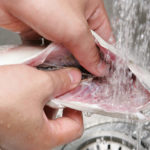Many people often believe that frying the fish before adding it to sour soup will help reduce the fishy smell and make the fish meat firmer because it is covered by a “film” when fried.
The act of frying fish has also become a debate on cooking forums because some people believe that frying the fish will make the soup smell like fried fish, so it will not be refreshing. Others believe that if the fish is not fried, it will be fishy and the soup will not be aromatic.
In fact, cooking is according to the taste of each family in each region. And whether to fry fish or not is also a characteristic of many families’ cooking.

Some people like to fry the fish before cooking the soup, while others believe that cooking it this way will reduce the sweetness of the fish
Does frying the fish before cooking reduce the fishy smell?
Whether to fry the fish before cooking depends on the taste of the family. However, does frying the fish first and then adding it to the soup reduce the fishy smell?
The fishy smell in the fish soup mainly comes from the fish being left for a long time, and the amino acids in the fish are changed, causing the fishy smell. Moreover, the fishy smell when cooking fish is due to unsanitary processing and adding cold water when cooking the fish.
Therefore, the fishy smell mainly comes from the way of cooking and handling the fish. Frying the fish can contribute to reducing the fishy taste because when frying it lightly, the outer layer of the fish comes into contact with hot oil, quickly shrinking and helping to retain the sweet fish water inside and not releasing too many amino acids into the soup, reducing the fishy taste. Moreover, when frying fish, there is a fragrant smell of oil, which also masks the fishy smell. However, this is not the most important factor in reducing the fishy taste.
The most important factor in reducing the fishy taste is to choose fresh fish, cook it immediately, handle the fish cleanly, and cook the fish soup in the correct order to prevent it from being fishy. If the fish is not fresh or the fish is not cleaned properly, frying it first will still make it fishy.

To prevent the fish soup from being fishy, the most important thing is still the handling and cooking process
Tricks to reduce the fishy taste in fish soup
Do not use cold water, use boiling water to cook the fish soup
When cooking fish soup, you need to boil the water before adding the fish, whether it has been fried or not. Because when adding the fish when the water is boiling, the fish quickly shrinks, retaining the sweet taste in the meat. When the fish is boiled, it quickly contracts, and the fish skin is cooked quickly, so it does not release many amino acids that make the soup fishy. If you need to add more water to the soup, prepare some boiled water next to it. If you add cold water, the fish will become fishy.
Opening the lid while cooking will reduce the fishy smell
Some of the amino acids in the fish dissolve into the water, causing a fishy smell. They will evaporate when opening the lid. Therefore, the fishy smell in the pot will be reduced. When the fish is boiling, it should be simmered gently, not boiled vigorously, so that the meat remains tender, sweet, and the nutrients are not severely degraded in the water, so the fish soup will be less fishy.
Use spices to reduce the fishy taste
When cooking fish soup, it is advisable to use enough suitable spices to reduce the fishy taste. The way to cook sour soup in some northern regions is to add turmeric, fermented rice to create flavor and reduce the fishy taste. Some places use sour fruits such as sour ear mushrooms, tomatoes, bitter melon… The sour soup in the southern region usually uses sweet fruits (pineapple) to create a sweet taste and reduce the fishy taste… In addition, aromatic herbs such as mint, dill, and green onions help reduce the fishy smell.
Reduce the fishy taste by rinsing the fish with alcohol
The way to handle the fish is extremely important in reducing the fishy smell. You need to clean it, scrub it with salt to remove the slime on the fish’s body, and scrape off the black membrane inside the fish to reduce the fishy taste. Moreover, white wine or cooking wine is very good at removing the fishy taste. You can soak the fish in a mixture of water and wine for about 10 minutes, the fish will be less slimy and less fishy.
When cooking sour soup, besides different flavors due to different spices used, different aromatic herbs used, and different cooking methods, whether to fry the fish or not also creates different tastes. The piece of fried fish will have the sweet taste in the meat, and the fish is exposed to the heat of hot oil, so it will have a slightly burnt smell and will not be as refreshing as the fish that has not been fried. People who are accustomed to eating fried fish and then cooking it often imagine that the uncooked fish will be fishy. Therefore, whether to fry or not depends on the taste preferences of each family.





































